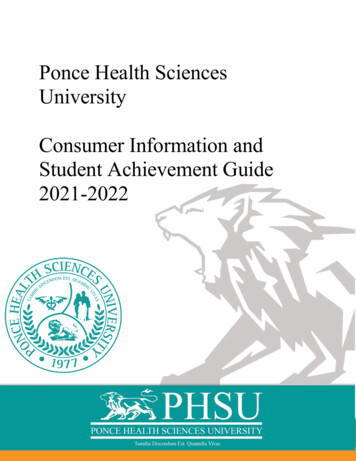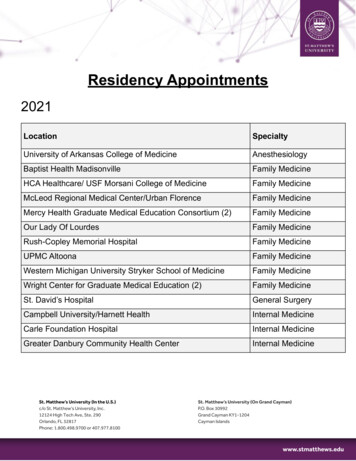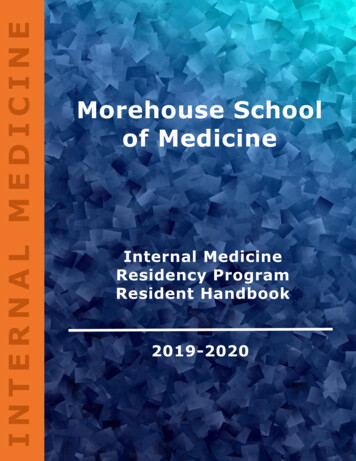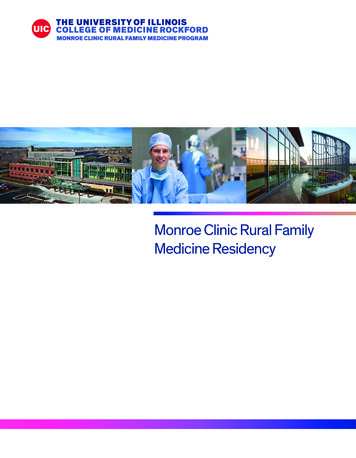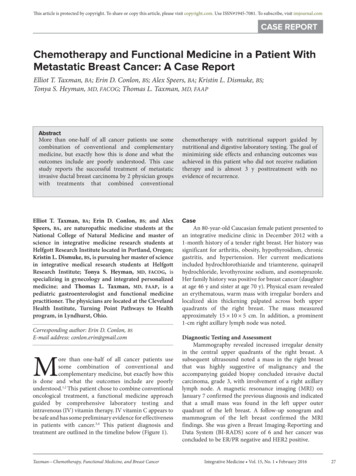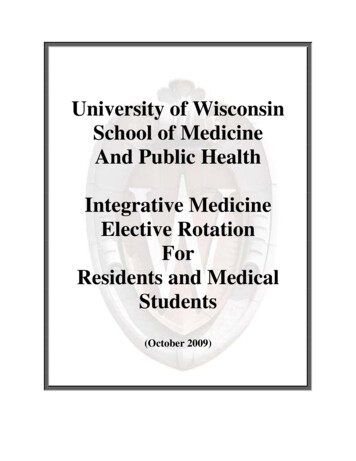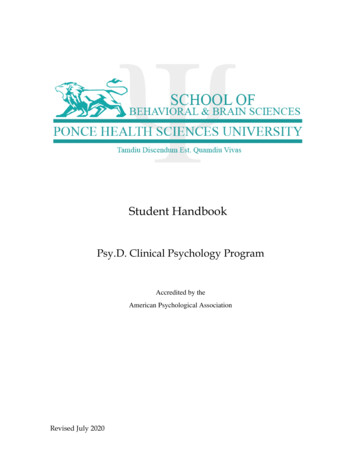
Transcription
Student HandbookPsy.D. Clinical Psychology ProgramAccredited by theAmerican Psychological AssociationRevised July 2020
Message from the DeanThe Psy.D. Clinical Psychology Program was conceived and designed, incorporating thebiopsychosocial orientation, consistent with the perspectives that have informed the discipline duringthe 21st century. The American Psychological Association’s (APA) Standards of Accreditation andthe National Council of Schools of Professional Psychology’s (NCSPP) competency training modelprovided direction to the new curriculum leading to its implementation in 1999.By the year 2000, the PsyD program became one of the first programs in the nation to offer arequired Psychoneuroimmunology course. Likewise, the first cohort of students was offered electivecourses in Health Psychology, Neuropsychological Assessment, Neurocognitive Rehabilitation, andPsycho-Oncology. By the time the first cohort of students reached their internship year, they hadlearned and mastered numerous contemporary evidence-based therapeutic modalities and techniques.This approach to Clinical Psychology earned the program much respect from local and nationalauthorities, including the accrediting bodies. Five years after accepting its first class, APA grantedthe program accreditation for three years. In 2007, APA granted full seven-year accreditation, thusrecognizing the program’s success in implementing its Practitioner/Scholar model based upon theBiopsychosocial/Systemic approach. In 2013, our program again obtained a seven-yearreaccreditation.The growth of Ponce Health Sciences University (PHSU) has continued over the years. At thismoment, we operate as the School of Behavioral and Brain Sciences (SBBS). Besides the PsyDprogram, we have an APA accredited Clinical Psychology PhD program, a Master in SchoolPsychology Program, a Professional Certificate in Family and Couples Therapy, and a ProfessionalCertificate in Neuroscience of Learning. An APA accredited pre-doctoral Internship program (Ponceinternship Consortium- PIC) operates at the SBBS.In 2018 SBBS started a PsyD program in San Juan Puerto Rico with the same curriculum andservices offered in the Ponce site. The APA Commission on Accreditation will visit both locationsduring the current year or early next year to evaluate the self-study report submitted for the conjointreaccreditation visit.We invite you to read this manual and visit our web page to familiarize yourself with the program’sofferings and resources as well as the faculty’s scientific and professional qualifications. Feel free tocontact us with any questions. Your concerns are important to us from the pre-admissions phase,throughout your professional formative years, and beyond.Welcome!Nydia Ortiz, Ph.D.Dean SBBS
Table of ContentsMESSAGE FROM THE DEAN . 1MISSION STATEMENT. 4PROGRAM GOALS AND OBJECTIVES . 4PROGRAM VALUES . 6STUDENT RELATED VALUES . 6FACULTY RELATED VALUES . 6ADMINISTRATIVE VALUES . 7REQUIRED AND ELECTIVE COURSES . 8REQUIRED FOUNDATION COURSES . 8REQUIRED CORE CLINICAL COURSES . 8REQUIRED PROFESSIONAL COURSES . 9ELECTIVE COURSES . 9REQUIRED PRACTICA. 10OTHER REQUIRED PRACTICUM . 10ELECTIVE PRACTICA . 10DISSERTATION . 10PREDOCTORAL INTERNSHIP . 10FACULTY . 10CORE FACULTY: PROFESSIONAL AND RESEARCH INTERESTS . 11ASSOCIATED FACULTY . 13ADMINISTRATIVE STAFF. 13ADMISSION REQUIREMENTS . 14TRANSFER OF CREDITS POLICY . 14PSYCHOLOGY DEGREE GRANTED . 15REQUIREMENTS FOR THE DEGREE . 15FIVE YEAR CURRICULUM SEQUENCE . 17COMPETENCIES OF THE PROGRAM . 20COMPETENCY: RELATIONSHIP . 21COMPETENCY: ASSESSMENT AND DIAGNOSIS . 21COMPETENCY: INTERVENTION / THERAPY . 21COMPETENCY: CONSULTATION, MANAGEMENT, AND SUPERVISION . 22COMPETENCY: CULTURAL AND INDIVIDUAL DIVERSITY . 22COMPETENCY: RESEARCH . 22PROGRAM POLICIES . 22CROSS REGISTRATION WITHIN PHSU PROGRAMS . 222
CROSS REGISTRATION WITHIN PSYCHOLOGY PROGRAMS . 23COMPREHENSIVE EXAMINATION AND CLINICAL PRACTICE EXAMINATION . 23STUDENT ANNUAL EVALUATION AND FEEDBACK . 26EVALUATION OF STUDENT PROFESSIONAL BEHAVIOR . 26IDENTIFICATION . 28USE OF CELLULAR PHONES . 28INSTITUTIONAL POLICIES . 29SATISFACTORY ACADEMIC PROGRESS POLICY . 29INSTITUTIONAL GRIEVANCE POLICY . 32GRIEVANCE PROCEDURE . 34COURSE DESCRIPTIONS . 353
Mission StatementConsonant with the concept that Clinical Psychology is an integral component of the HealthSciences, the Clinical Psychology Program at Ponce Health Sciences University aims to develop anew generation of Health Services Psychologists with a strong foundation on the biological bases ofbehavior, a broad understanding of the psychological processes and of the socio-cultural dimensionof normal and abnormal behavior. The students are immersed into a rich scientifically-basedcurriculum harmonized by a multidisciplinary faculty from the fields of Psychology, BiomedicalSciences, Clinical Medicine, and other disciplines of the health and social sciences, in order toprovide a broad understanding of human behavior and to develop clinical skills applicable inmultiple socio-cultural contexts.Program Goals and ObjectivesGoal 1: Develop in our students an in-depth, historically contextualized understanding of thepsychological (cognitive, affective, motivational), biological and socio-cultural bases of normal andabnormal behavior that serves as the foundation of clinical practice.Objective 1: Psychological Bases of BehaviorThe students will be able to describe the main theories on cognition, emotion, andmotivation, and apply them effectively in the delivery of psychological services.Objective 2: Biological Bases of BehaviorThe students will be able to demonstrate understanding of the biological bases ofbehavior and identify the signs and symptoms of neuropathological disorders.Objective 3: Human Growth and DevelopmentThe students will be able to outline the main theories of human growth anddevelopment.Objective 4: Sociocultural Bases of BehaviorThe students will be able to identify and describe the reciprocal interaction andimpact of socio-cultural aspects in the psychology of individuals, families and groups.Objective 5: Psychopathology and DiagnosisThe students will demonstrate command in the evaluation of patients’psychopathological signs and symptoms, and in the formulation of an appropriatediagnosis.Objective 6: Ethical and Legal StandardsStudents will be knowledgeable of all legal and ethical standards related to patient4
and therapist relationships in all psychological assessment and therapeuticinterventions.Goal 2: To prepare clinical psychologists for the ethical delivery of empirically supportedpsychotherapeutic interventions, assessment, diagnosis, consultation, education, supervision, andmanagement when assuming the contemporary roles of the profession while adopting a life longcommitment to professional growth based upon the evolving scientific knowledge and expandingscope of practice.Objective 1: Relationship CompetenciesThe students will demonstrate ability to form and maintain professionalrelationships with clients, colleagues, supervisors, faculty, other multidisciplinaryhealthcare team professionals, and community members in accordance with theethical standards and values of the profession.Objective 2: Assessment and Diagnostic CompetenciesThe students will demonstrate understanding and solid command of clinicalassessment and diagnosis.Objective 3: Therapeutic Intervention CompetenciesThe students will be able to appropriately select and implement psychologicalinterventions and document therapeutic progress accurately.Objective 4: Consultation, Management, and Supervision CompetenciesThe students will be able to serve as competent consultants, educators, supervisors,and managers applying a variety of intervention models appropriate for a broadrange of settings.Objective 5: Cultural and Individual Diversity CompetenciesThe students will demonstrate awareness, attitudes of respect, and appropriateresponses in the delivery of psychological services sensitive to the clients’ gender,socioeconomic status, affectional orientation, ethnicity, physical and mentalcapacities, religion, spirituality, and age as well as the interrelationships of theseidentities and statuses.5
Objective 6: Research CompetenciesThe students will be able to apply current research to their clinical practice and toexercise command of different methods of scientific inquiry.Program ValuesStudent Related ValuesCore Value: Our program is Student Oriented The main purpose of the Clinical Psychology Program is to develop excellent professionalpsychologists. Therefore, every activity performed by our program has as its immediate andultimate goal the improvement of students’ learning outcomes. Our program will provide all students the educational services they need to achieve their goal ofbecoming competent Clinical Psychologists. Students presenting academic or clinicalperformance deficiencies will receive the type of remedial help needed to overcome them. Our program respects the students’ religious, affectional, and/or ethnic orientation orpreferences. Students will benefit from their interactions with our staff and faculty and will never be subjectto abuse or intentional harm. It is our intention to admit students capable of successfully completing the program. Onceaccepted, the program assists students to achieve their vocational goal. Students are expected tomake a serious commitment to the program and to comply with all academic and skill-buildingrequirements. Our students want to learn and will learn when an adequate learning environment is created andmaintained. Feedback is needed to allow students to monitor their learning process, their clinicalperformance, and their personality development.Faculty Related ValuesCore Value: Faculty members deliver educational services of excellence The program’s most precious resource is its faculty. The program’s administration is committed to facilitating the educational responsibilities andactivities of all faculty members.6
Our program recognizes that each faculty member needs to feel appreciated and safe, andexpects to be treated with courtesy and respect. Our program is evaluation-rich and provides opportunities for students to provide feedback ontheir performance to all faculty members and/or supervisors. Such feedback should improve thequality of the educational services offered. Our program expects all faculty members to model ethical and professional behavior to allstudents in their interactions. The program’s administration recognizes that faculty members need the freedom and theresources to up-grade their knowledge base and clinical skills through continuing educationefforts, through faculty development activities and by conducting research activities. The program encourages all faculty members to develop their research and/or scholarly activitiesbased upon their particular interests and the needs of the program.Administrative ValuesCore Value: The Administration of the Clinical Psychology Program is committed to fostering ahumane environment and to promote the program’s mission, goals, and values. The administration of the program acknowledges the responsibility it has to harmonizeeffectively the different subsystems of the educational process: students, faculty, staff, PHSUadministration, community, accrediting agencies, the field of psychology, etc. The administration will seek the necessary resources to facilitate the students’ learning processand to support the teaching activities of all professors. The program’s administration will support all faculty members and all students interested indeveloping research projects. The administration of the program represents the vision, mission, and image of the ClinicalPsychology Program to the public through professional and civic activities, through the media,and through the recruitment of interested individuals. The administration of the program sets an example for faculty and students with regards to thestyles of interaction within all members of the academic community and in creating a supportiveinterpersonal environment. The administration supports a continuous improvement approach to management and fosters theperiodic evaluation of all processes and procedures.7
Required and Elective CoursesThe required foundation and clinical courses, together with the elective courses and all practicaavailable through the program, are presented below. The program curriculum is designed to becompleted in four years by regular students. Students entering with a master’s degree (advancedstanding students) complete the core curriculum in three years. Regular students take electivecourses during their fourth year in the program. Our curriculum includes all competencies for thetraining of clinical psychologists proposed by the National Council of Schools and Programs inProfessional Psychology and is updated periodically according to the accreditation requirements ofthe American Psychological AssociationRequired Foundation CoursesPSY 5110 Fundamentals of Neuroscience (3)PSY 5120 Neuroanatomy Laboratory (2)PSY 5140 Neurobiology and Psychology of Emotion and Motivation (2)PSY 5150 Human Growth and Development (3)PSY 5180 Principles of Psychoneuroimmunology (1)PSY 5220 Psychology of Personality (3)PSY 5230 Cognitive Psychology (3)PSY 5270 History of Psychological Thought (2)PSY 5730 Ethics in Professional Psychology (2)PSY 6200 Applied Research for Psychologists (2)PSY 6250 Test Construction (2)PSY 6230 Qualitative/Quantitative Methodology and Descriptive Statistics (3)PSY 7310 Racial, Ethnic and Cultural Diversity (3)PSY 8320 Social Bases of Behavior (3)Total Credits: 34Required Core Clinical CoursesPSY 5410 Fundamentals of Clinical Psychopathology (2)PSY 6450 Mood and Anxiety Disorders (3)PSY 6480 Psychopathological Disorders in Children and Adolescence (2)PSY 6520 Cognitive Assessment (3)PSY 6580 Projective Assessment of Personality (2)PSY 6600 Behavior Modification: Theory and Practice (2)PSY 6620 Cognitive and Cognitive Behavioral Therapy (2)PSY 6670 Short-Term Psychotherapy (2)PSY 6860 Introduction to Psychological Assessment and Testing (2)PSY 6870 Psychotherapy Seminar (1)PSY 7170 Clinical Psychopharmacology (2)PSY 7470 Personality and Psychotic Disorders (3)PSY 7670 Family Therapy and Systemic Intervention (2)PSY 7660 Group Processes and Group Psychotherapy (2)PSY 6570 Objective Assessment of Personality (3)PSY 8140 Psychology of Addictions (2)Total Credits: 358
Required Professional CoursesIHD 9190 Interprofessional Perspective In Health Disparities (1)PSY 7720 Program Development and Administration in Mental Health (2)PSY 7730 Supervision and Consultation (3)Total Credits: 6Elective Courses(Minimum of 11 credits)PSY 7190PSY 7560PSY 7570PSY 7640PSY 7650PSY 7850PSY 7880PSY 8000PSY 8110PSY 8120PSY 8160PSY 8180PSY 8190PSY 8330PSY 8350PSY 8360PSY 8380PSY 8390PSY 8400PSY 8450PSY 8470PSY 8480PSY 8490PSY 8510PSY 8650PSY 8670PSY 8680PSY 8700PSY 8710PSY 8730PSY 8740PSY 8750PSY 8780PSY 8790The Practice of Psycho –Oncology with Children and Adults (2)Psychoeducational Assessment and Consultation (3)Advanced Projective Assessment (3)Psychotherapeutic and Systemic Interventions with Children and Adolescents (2)Post Modern & Solution Oriented Therapies (2)Clinical Psychology in the General Hospital Setting (1)Advanced Projective Assessment Practicum ( 0 )Independent Study (up to 6 credits per project)Anatomy and Physiology for Professional Psychologists (3)Anatomy Laboratory (1)Integrated Behavioral Healthcare (2)Clinical Health Psychology (2)Functional and Correlational Neuroanatomy (2)Fundamentals of Social Determinants of Health (2)Psychology and Poverty (2)Psychology of Gender (2)Psychology of Sexual Orientation and Gender Diversity (2)Child Maltreatment (2)Integrated Sexual and Gender Affirmative Interventions (2)Sports Psychology (2)Neuropathological Conditions (2)Antisocial Personality Disorder and Sexual Deviant Behaviors (2)Forensic Psychological Assessment (3)Neuropsychological Assessment (3)Autism Spectrum Disorders: Contemporary Theories and Intervention Models (2)Dialectical Behavioral Therapy (2)Advanced Family Therapy (2)Studies in Human Sexuality (2)Forensic Psychology (2)Psychology and Public Policy (2)Geriatric Psychology (2)Neuropsychological Rehabilitation (2)Brain, Psyche and Psychopathology (2)Contemporary Psychoanalytic Therapy (2)9
Required PracticaPSY 5810 Introduction to Clinical Practice (50 hrs.)PSY 5820 Fundamentals of Clinical Interventions and Emergency Psychology (50 hrs.)PSY 6830 Psychotherapeutic Techniques (250 hrs.)PSY 6850 Conceptualization & Intervention Planning (250 hrs.)PSY 7860 General Clinical Practice: Integration I (250 hrs.)PSY 7870 General Clinical Practice: Integration II (250 hrs.)Total (Minimum) hours of Clinical Practica: 1100Other required practicumPSY 6810 Cognitive Assessment Practicum (30 hrs.)PSY 6880 Practicum Projective Personality Assessment (30 hrs.)PSY 7240 Research Practicum: Data Collection & Data Analysis (30 hrs.)PSY 7810PSY 8810PSY 8820PSY 8830PSY 8840PSY 8850PSY 8880Elective PracticaGeneral Clinical Practicum. Second Year SummerAdvanced Clinical Practicum I. Third Year SummerAdvanced Clinical Practicum II. Fourth YearAdvanced Clinical Practicum III. Fourth YearAdvanced Clinical Practicum IV Fifth YearAdvanced Clinical Practicum V Fifth YearAdvanced Clinical Practicum: Health Psychology (250 hrs.)DissertationPSY 8260 Doctoral DissertationPredoctoral InternshipPSY 9000 Pre-doctoral Internship (2000 hrs.)FacultyAs stated in our “Program Values”, our faculty constitutes the program’s main asset. We have beenable to select and retain a group of seasoned and junior faculty members who enjoy teaching,interacting and training students. They are professionals mindful and reflective of their ownpersonality and professional growth and who value the program’s philosophy and mission. Thisfaculty is multidisciplinary and therefore capable of providing a broader range of didactic andclinical experiences to our students. By the end of their training, our students are familiar with thedifferent professional roles needed to practice contemporary Clinical Psychology in diverse clinical,educational and community-based settings.10
Core Faculty: Professional and Research InterestsNydia Ortiz, Ph.D., Professor, Dean of School of Behavior and Brain SciencesFamily Therapy and Systemic Interventions, Narrative Therapies, Addictions, Primary CarePsychology and Supervision.Giselle Medina Vélez, Psy.D., Professor, Clinical Psychology Program DirectorPediatrics Psychology, Integrated Health Care, Development, Child and Adolescents Psychotherapy.Julio Jiménez, M.D., ProfessorPsychoneuroimmunology, HIV/AIDS, Behavioral Medicine, Psychopharmacology, PsychoanalyticPsychotherapy.Ernesto Rosario, Ph.D., ProfessorTest Construction, Research, Statistics.María Garrido, Psy.D., ProfessorPersonality Assessment with MMPI-2/A/RF, Cognitive and Cognitive Behavioral Therapy andConsultation in Legal Systems.Nydia M. Cappas, Psy.D., ProfessorPrimary Care Psychology, Psychology of Gender, Diversity, Administration in Mental Health.Javier Hernández, Psy.D., Associate ProfessorClinical Neuropsychology, Health Psychology Inpatient Settings, Neuropsychological RehabilitationWalter Rodríguez, Psy.D., Assistant ProfessorCognitive Psychology,Neuropsychological Assessment and Rehabilitation.Valerie Toro, Psy.D., Associate ProfessorEthics, Emergency Psychology, Primary Care Psychology, Family Therapy.Hiradith Menéndez, Psy.D., Assistant ProfessorMood and Anxiety Disorders, Psychotherapy, Dialectical Behavioral Therapy.Viviana Hoyos, Psy.D, Assistant ProfessorPrimary Care Psychology, Projective Assessment, Behavior Modification.Efrain Ríos, Psy.D. Assistant ProfessorBehavior and Genetics, Neurodevelopmental correlates of Psychoanalytic Theory, Neuroscience ofLearning.Eunice Alvarado, Psy.D., Assistant ProfessorCognitive Assessment, Forensic Psychology.11
Marielly González, Psy.D., Assistant ProfessorPsychological Assessment, Psychotherapy.Bárbara Barros, Psy.D., Assistant ProfessorDialectial Behavioral Therapy, Group Psychotherapy Womens Health Psychology.Oxalis Jusino, Psy.D., Assistant ProfessorPsychoeducational Assessment, Projective Personality Assessment.Alexandra Ramos, Ph.D., Assistant ProfessorPsychoeducational Assessment, Social PsychologyStephanie Vega, Psy.D., Associate Professor, Clinical Practice CoordinatorCognitive and PeAssessmentClaudia Mántaras, Psy.D., Assistant ProfessorAutism, Cognitive Assessment.Rafael Oliveras, Psy.D., Assistant ProfessorPediatrics Neuropsychology, Genetics, Autism.Karla Martínez, Ph.D., Assistant ProfessorNeuroscience, Addictions, Neurodegenerative Disorders, Alzheimer.Ivette Mirles, Ph.D, Assistant ProfessorPsychopharmacology, Psychological Assessment, Health PsychologyAmilcar Colon, Ph.D., Assistant ProfessorSports Psychology, Positive PsychologyEmily Pérez, Ph.D., Assistant Professor, PsyD San Juan Center CoordinatorNeuropsychology, Neuroscience.Yassira Cedano, Psy.D., Assistant Professor, Clinical Practice Coordinator - San Juan CenterPsychological AssessmentLuisa Ortiz, Psy.D., Assistant ProfessorPsychology of Gender, Psychology and Poverty.Juan González, Ph.D., Assistant ProfessorPositive Psychology, Spirituality, Research Methods.Javier Piazza, Psy.D., Assistant ProfessorFamily Therapy, Supervision and Consultation.12
María G. Márquez, Psy.D., Assistant ProfessorHealth Psychology, Mood DisordersKeyshalee Gómez Arroyo, Ph.D., Assistant ProfessorHealth Psychology, Psychotherapy.Jesús Rodríguez Cales, Ph.D., Assistant ProfessorTest Construction, Research, Statistics.Johana Estrada Rodriguez, Psy.D, Assistant ProfessorPsychological Assessment, Health Psychology.Associated FacultyJuan Fernández, Ph.D., ProfessorAnatomy and Neuroanatomy, General PhysiologyMarta Febo, M.D., ProfessorDirector, Standardized Patient Program. Clinical Health Psychology, GeropsychologyAxel Ramos, Ph.D, Assistant ProfessorClinical Health Psychology, Community based participatory research.Beatriz Cintrón, Psy.D., Assistant ProfessorProjective Personality Assessment, Primary Care PsychologyLaura Deliz, Psy.D., Assistant ProfessorNeurodevelopmental disordersJonathan Echevarría, Psy.D., Adjunct FacultyPsychotherapy, AddictionsMariana Vazquez, Psy.D., Adjunt FacultyPersonality AssessmentAdministrative StaffDeadina González, MBAAdministrative CoordinatorCarmen Ballester, MAAdministrative AssistantDorimar Rodríguez, BBAAdministrative AssistantMarisol Blasco, BAReceptionist13
Admission RequirementsCandidates for admission will satisfy the following minimal requirements: A bachelor’s degree from a college or university approved by the Council on HigherEducation and/or by the corresponding regional accrediting agencies. At least 15 credits in Psychology at the bachelor’s level including de following courses:Course CreditsGeneral PsychologyDevelopmental PsychologyStatisticsAbnormal PsychologyExperimental Psychology orResearch Methods33333 Submit an official transcript of all college level work completed and of all graduate coursestaken. Failure to submit transcripts of any graduate or undergraduate work is considered aserious offense. A minimal GPA of 3.00 Results within the mean on the “Examen de Admisión a Estudios Postgraduados” (EXADEP)or in the Graduate Record Examination (GRE) Three letters of recommendation from professors and or professionals familiar with thecandidate’s performance in academic and work settings. Certificate of good conduct from the Police Department. One day interview process including written essays.Transfer Of Credits PolicyPHSU will acknowledge prior academic learning experiences earned by some of the studentsapplying for admission to its Psy.D. program. However, the following criteria will apply inconsidering courses for transfer;Up to 24 credits taken by students in programs closely related to Psychology, may be transferred.Most of the courses to be transferred from other institutions will serve to satisfy the electiverequirements of the program. Students with prior graduate work in a field outside mental health mayobtain credit for up to 18 credits depending on the nature of the program attended and the coursestaken.The following requirements will guide the evaluation process of those courses submitted forapproval. Courses need to be relevant to the field of Clinical/Professional Psychology Only courses approved with a minimum grade of B will be considered for transfer.14
It is the student’s responsibility to facilitate the course syllabus and the official catalog of theinstitution where the course (s) requested for transfer was/were taken.The following courses will be considered for transfer from previous graduate work.CoursesPSY 5140PSY 5270PSY 5730PSY 6200PSY 6230PSY 6250PSY 7170PSY 7240PSY 7310PSY 7670PSY 7720PSY 7730PSY 8320TitleNeurobiology and Psychology of Emotion and MotivationHistory of Psychological ThoughtEthics in Professional PsychologyApplied Research for PsychologistQualitative / Quantitative Methods & Descriptive StatisticsTest ConstructionClinical PsychopharmacologyResearch Practicum: Data Collection and Data AnalysisRacial, Ethnic, and Cultural DiversityFamily Therapy and Systemic InterventionProgram Development and Administration in Mental HealthSupervision and ConsultationSocial Bases of BehaviorPsychology Degree GrantedThe degree in Psychology to be granted is t
Psychology Program, a Professional Certificate in Family and Couples Therapy, and a Professional Certificate in Neuroscience of Learning. An APA accredited pre-doctoral Internship program (Ponce internship Consortium- PIC) operates at the SBBS. In 2018 SBBS started a PsyD program in San Juan Puerto Rico with the same curriculum and
